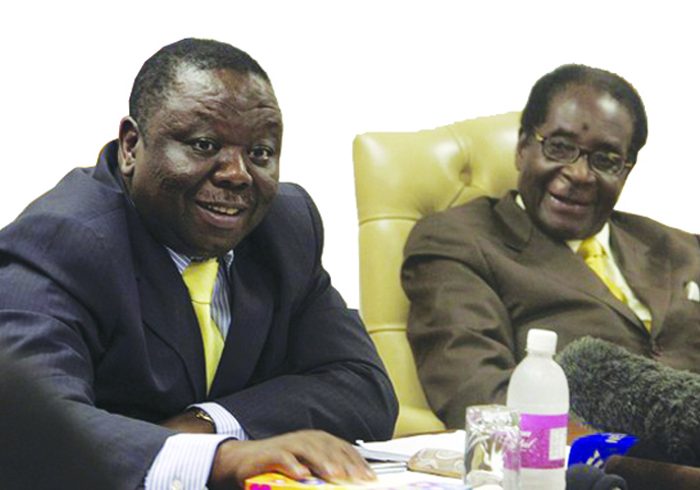


 POSSIBLE unity talks between ZANU-PF and the troubled Movement for Democratic Change (MDC-T) have divided outgoing Prime Minister Morgan Tsvangirai’s party with hardliners in the faltering movement equating the potential for cooperation with their archrivals as dining with the devil.
POSSIBLE unity talks between ZANU-PF and the troubled Movement for Democratic Change (MDC-T) have divided outgoing Prime Minister Morgan Tsvangirai’s party with hardliners in the faltering movement equating the potential for cooperation with their archrivals as dining with the devil.
The lack of consensus within the MDC-T on the possibility of cooperating with ZANU-PF in government comes at a time when President Robert Mugabe is set to be inaugurated today, the first step in giving him a mandate to form the next government.
On both sides, ZANU-PF and the MDC-T, there is realisation that a winner-takes-all mentality to governance would not pull the country’s economy from the doldrums.
There are therefore attempts by moderates in ZANU-PF to influence the cooption of some MDC-T officials in government as a way of getting Tsvangirai’s party to cooperate with President Mugabe whose biggest challenge is that of turning around the country’s economy.
The inclusion of some elements from the opposition in President Mugabe’s new administration is seen as a crucial step towards mending frosty relations between ZANU-PF and the West, which believes that the MDC-T was prejudiced in the just-ended elections.
Three weeks ago, Tsvangirai told his supporters that there were overtures from ZANU-PF to accommodate the MDC-T in the next government in the face of President Mugabe’s landslide victory in elections.
Sources told The Financial Gazette this week that there were deep divisions in the MDC-T over the issue of cooperating with ZANU-PF, a party they say stole the elections from them.
So far, one senior member of the MDC-T Roy Bennett has since announced that he was stepping aside from active involvement in the party and castigated his colleagues whom he said were angling themselves for the trappings of power.
But one losing MDC-T member revealed this week that he will not be surprised if some of the party’s top officials were to join President Mugabe’s administration.
He said: “Some have nothing to lose. They got in there to make themselves comfortable. Some probably surprised with easy money, negated the founding principles of the party. I lost my brother, my family, my property and my well being, I will be the last man standing so help me God.”
If any talks were to take root between the two parties, they would be internally driven as opposed to 2009 when they were forced on the parties by the Southern African Development Community (SADC) and the African Union (AU) following the disputed 2008 presidential polls that the two bodies said were not a reflection of the will of the people.
The AU and SADC have endorsed the July 31 poll and the regional grouping, at its summit held in Malawi over the weekend, congratulated President Mugabe for his victory.
On the eve of the elections, President Mugabe was asked whether another unity government was in the offing. He responded by saying it would all depend on what people would have said in the elections, without elaborating.
The ZANU-PF leader went on to post a 62 percent win, compared to Tsvangirai’s 33 percent in the presidential race, with ZANU-PF claiming more than two thirds of Parliamentary seats.
ZANU-PF’s victory means that the party is in a much stronger position than it was in 2009 hence short of being swallowed, the MDC-T is unlikely to get anything meaningful from the talks.
ZANU-PF’s secretary for administration, Didymus Mutasa, said this week his party was willing to work with MDC-T members, but they should first join President Mugabe’s party if they want any recognition, an indication that the party would be playing a hard bargain, more of a take-it-or-leave-it affair.
“We will be happy to work with them but first they should join ZANU-PF as members. There is no doubt that ZANU-PF is going to form the next government,” said Mutasa.
This week, the spokesperson of the South African facilitation team, Mac Maharaj, said SADC had noted that President Jacob Zuma’s facilitation in Zimbabwe had come to an end and that the issue of possible unity talks were not on the table.
“We can’t speculate on that. There was nothing on the table. You can ask the executive secretary of SADC that,” said Maharaj.
Tomaz Salamao, SADC’s executive secretary was not immediately available for comment.
In its communiqué, the regional grouping said it had noted with satisfaction Zimbabwe’s holding of free and peaceful harmonised elections on July 31 and reiterated its call for the lifting of all forms of sanctions hitherto imposed on the country.
But as the nation prepares to see President Mugabe’s next move in appointing a new Cabinet, both ZANU-PF and the MDC-T could not commit themselves to any pact.
Even though Tsvangirai said he was approached, MDC-T spokesperson Douglas Mwonzora said there are no talks happening at the moment.
Asked what would be the party’s position should an offer be made to them, he added: “I don’t want to ever speculate on things that may or may not happen.”